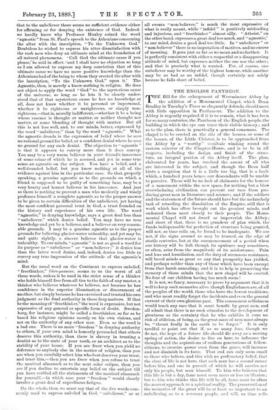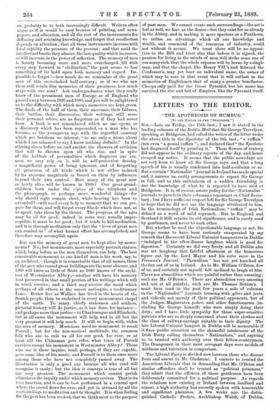THE ENGLISH PANTHEON.
THE Bill for the enlargement of Westminster Abbey by the addition of a Monumental Chapel, which Dean Bradley in Tuesday's Times so eloquently defends, should meet with little opposition in Parliament. The addition to the Abbey is urgently required if it is to remain, what it has been for so many centuries, the Pantheon of the English people, the building in which the eye can trace their visible history ; and as to the plan, there is practically a general consensus. The chapel is to be erected on the site of the houses, or some of the houses, of the Little Cloister, is to be approached from the Abbey by a "worthy" vestibule winding round the eastern exterior of the Chapter-House, and is to be in all respects, including the design and finish of the struc- ture, an integral portion of the Abbey itself. The plan, elaborated for years, has received the assent of all who are interested in the subject, and though the Dean half hints a suspicion that it is a little too big, that is a fault which, a hundred years hence, our descendants will be unable to perceive. There will be no lack of claimants for the honour of a monument within the new space, for nothing but a blow overwhelming civilisation can prevent our race from pro- ducing great men in literature and science; and if the soldiers and the statesmen of the future should have but the melancholy task of retarding the dissolution of the Empire, still that is work which has often brought out the greatest minds, and endeared them most closely to their people. The Monu- mental Chapel will not dwarf or impoverish the Abbey ; and short of that, there is no grandeur of plan which, the funds indispensable for perfection of structure being granted, will not, as time rolls on, be found to be inadequate. We are not, if the signs around us may he trusted, on the edge of sterile centuries, but at the commencement of a period when our history will be full, though its opulence may sometimes, or often, arise from the magnitude of its misfortunes. Pain and loss and humiliation, and the duty of strenuous resistance, will breed minds as great as any that prosperity has yielded, and perhaps nobler than any of those which have been exempt from that harsh annealing; and it is to help in preserving the memory of those minds that the new chapel will be erected. No fear of our children having too much room !
It is not, we fancy, necessary to prove by argument that it is well to keep such memories alive, though Englishmen are, of all the peoples of the world, those who have the fewest traditions, and who most readily forget the incidents and even the general current of their own glorious past. The commonest selfishness would teach any race that it must benefit by great men, and all admit that there is no such stimulus to the development of greatness as the certainty that he who exhibits it runs no risk of oblivion, of being, as the great mass of men must always be, " thrust foully in the earth to be forgot." It is only needful to point out that if, as so many fear, though we do not, the hope of a future life should die away as a moving spring of action, the desire to live on here, to influence the thoughts and the aspirations of endless generations of fellow- citizens, to exercise power even from the grave, will increase and not diminish in its force. That end can only seem small to those who believe, and this with no perfunctory belief, that the close of life is not here, that each man has a second career before him, and one in pursuit of which he will survive not only his people, but man himself. To him who believes that this life is but a day, fame must seem more or less an illusion ; but to him who thinks this life will be all, fame must be often the nearest approach to a spiritual reality. The preservation of the memories of the great will be at least as important to an unbelieving as to a reverent people, and will, as time rolls on, probably be to both increasingly difficult. Writers often argue as if it would be easy because of printing, and news- papers, and education, and all the rest of the instruments for diffusing and retaining knowledge, and forget that recollection depends on attention ; that all these instruments increase with fatal rapidity the pressure of the present; and that amid the intellectual bustle they admire, the last quality which increases, or will increase, is the power of reflection. The memory of men is hourly becoming more and more overcharged, till with every step forward in " civilisation," the past seems to lose something of its hold upon both memory and regard. Im- possible to forget l—how much do we remember of the great men of this over-choked half-century ; or if we who saw them still retain dim memories of their greatness, how much stays with our sons? Ask undergraduates what they really know of the prominent men of Europe or of England who passed away between 1830 and 1880, and you will be enlightened as to the difficulty with which men's memories are kept green. The deeds of the half of them, their successes, their failures, their battles, their discoveries, their writings, still more their personal selves, are as forgotten as if they had never been. A book is not remembered which no one opens, or a discovery which has been superseded, or a man who has become, as the youngsters say, with the regretful courtesy which yet betokens no interest, " to me only a name, about which I am ashamed to say I know nothing definite." In the stirring times before us, and amidst the showers of criticism that will be thrown upon all who rise, and in spite of the hubbub of personalities which disgraces our era, men, we may rely on it, will in self-protection develop a magnificent power of being ignorant, and of forgetting all greatness of all kinds which is not either isolated by its supreme magnitude or forced on them by influences beyond their own control. How many of the great now or lately alive will be known in 1989 ? Our great-grand- children born under the regime of the telephone and the phonograph, or perhaps more wonderful things—for why should sight remain short, while hearing has been so extended ?—will need every help to memory that we can pre- pare for them, and will forget every Shade which does not, so to speak, take them by the throat. The progress of the ages may be all for good ; indeed, in some way, usually imper- ceptible, it must be for good ; but it tends to kill meditation, and it is through meditation only that the " lives of great men can remind us" of what human effort has accomplished, and therefore may accomplish again.
But can the memory of great men be kept alive by monu- ments ? No ; but monuments, more especially portrait statues, which bring before us the men themselves, can help. The best conceivable monument to one kind of man is his work, say, to an architect,—though it is remarkable that of all names, those of the men who reared great buildings are the most obscure, and 1989 will know as little of Scott as 1889 knows of the archi- tect of Westminster Abbey;—another. will have his memory best preserved in that small portion of his writings which will in truth survive; and a third may receive the weed which perhaps of all others is the surest antiseptic, a traditionary fame. Better live as Wallace has lived in the hearts of the Scotch people, than be enshrined in every monumental chapel of the earth. To many, chiefly statesmen and soldiers, pictorial history will do justice, as it has done, for instance— and perhaps more than justice—to Charlemagne and Elizabeth; but in all cases the monument will help, and in all but the very greatest it will help much. It will, to begin with, widen the area of memory. Musicians need no monument to recall Purcell ; but for the non-musical multitude, the common folk who are to rule us all for our good, for ever, or at least till the Chinaman gets rifles, what trace of Purcell survives except his monument in Westminster Abbey? Those who see it there inquire, read, perhaps, if they are capable, gain some idea of his music, and Purcell is to them once more among those who have not completely passed away. The illustration is only a good one because all who read will recognise it easily ; but the idea it conveys is true of all but the very greatest. The monument which cannot perish stimulates the inquiry under which memory revives. That is its true function, and it can be best performed in a central spot where the crowd flows for ever, and yet is attuned by all the surroundings to meditation and to thought. It is when feeling for the past has been evoked, that we think most to the purpose of past men. We cannot create such surroundings—the art is lost as well, we fear, as the desire—but they exist for us already in the Abbey, and in making it more spacious as a Pantheon, we utilise an advantage which all our knowledge and wealth, and command of the resources of industry, could not without it secure. We trust there will be no opposi- tion to the Bill, and trust also that before it is signed, the passion for living in the minds of men will strike some one of our many rich, that the whole expense will be borne by a single man, and that the chapel, like Henry VII.'s and Edward the Confessor's, may yet bear an individual name, the owner of which may be sure in that event that it will outlast in the memories of Englishmen that of many a greater benefactor. Cheops only paid for the Great Pyramid, but his name has survived the rise and fall of Empires, like the Pyramid itself.



































 Previous page
Previous page